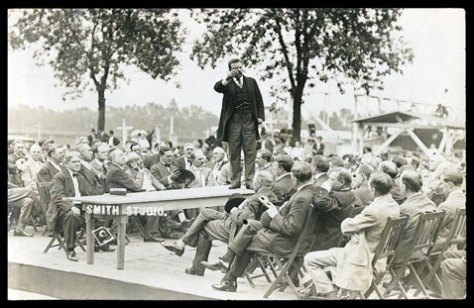
Being an effective speaker is not unlike being an effective writer. The basic tenets of each are quite similar:
- Understand your purpose
- Be thoughtful in your preparation
- Communicate clearly and concisely
- Leave your audience with a vivid message
So, why is it that so many of us would rather endure hours of manual labor than give a 20-minute speech?
Perhaps it has to do with a lack of confidence. Or, maybe we assume that the audience isn’t really interested in what we have to say. More simply, maybe we just don’t want to be stared at. All of these are valid concerns, of course. But to get ahead in life – professionally or otherwise – I think we can all agree that it would be in our best interest to just get over it.
Now, having established the need for public speaking skills, let’s get to the heart of the matter: How to develop and deliver a great speech.
PURPOSE.
Chances are, your audience is overwhelmed. They have job responsibilities and home responsibilities, need to get to the gym, and plan the menu for game night this weekend. That said, they have each generously carved out part of their day to listen to you. Out of respect, make sure you have a good reason for standing in front of them. Before you begin to write your speech, clearly develop the message you wish to convey.
Then simplify it.
Repeat your central message often to make your point clear.
PREPARATION.
As noted in a previous post about effective writing, editing is key to successful communication. This is true for speechwriting and delivery as well – perhaps more so. As a starting point, it’s safe to assume that about half of the first draft of your speech will be unnecessary and/or unclear. Get out the red pen and start slashing.
Why is this important? Because if your audience is confused for 10 minutes of your 20-minute speech, they will begin to doubt whether they really understood the other 10 minutes they thought they got. Got it?
Clarity leads to confidence. Edit away.
TELL A STORY.
Everyone, young and old, loves a good story. Take care to craft your speech from start to finish. Begin with a strong lede – your first sentence. Make your audience eager to hear the second and third…Your speech should flow as a tale with a beginning, a middle, and an end. The audience will “see” your words in their minds as you speak, so create the context for them.
If you do so effectively, every member of the audience will begin to picture him- or herself as the “hero” of the story: What would I do in that situation? How did I handle that conflict? How will I use this information in my next project? They will listen carefully because you are offering relevant and helpful information.
You are giving them the tools to move forward in their own story.
MOTIVATE AND INSPIRE.
Once you have the audience listening (which, because of your fantastic lede, will be from the moment of your first utterance)…make them feel. Your basketball coach doesn’t just tell you to go out and win your next game – she enthusiastically psyches you up so you feel excited about the prospect of making it to the state tournament. Likewise, your audience will feel what you feel.
If you are engaged, so will they be. If you are passionate about your subject matter, they will be more inclined to feel it too. You are the only one who can convince your audience that your subject matters to them.
Make it obvious that it matters to you.
ACHIEVE SUCCESS.
Your goal for each presentation is straightforward: When you have concluded, you want someone in the audience to approach you to tell you have inspired, motivated, or educated him – and he can’t wait to hear you next time…
Remember, practice makes perfect so step up and try! At worst, you’ll tank and never be asked to speak again. At best, you’ll bring down the house and feel pretty good about what you have accomplished.
*More Useful Tips:
- You may be a very eloquent speaker. This will certainly impress your audience, but don’t forget to move them.
- Look people in the eye individually to connect with them. Remember the people at the back of the room.
- You are not Ellen Degeneres. Be careful with jokes.
- Have a very good reason to use visual aids. Would Martin Luther King’s I Have A Dream speech have been better with a little Powerpoint action? Exactly.
- How do you give a magnificent 30-minute speech? Make it 22 minutes.
*Highlights and paraphrases from the book You, Inc.
Resources:

